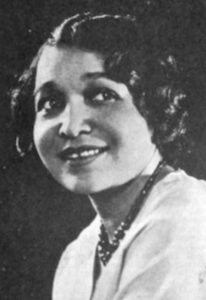One of UC Berkeley’s first African American graduates and Oakland’s first black teacher
by Deborah Qu
In 1921, the members of the black sorority Alpha Kappa Alpha stood proudly together for a photo to be featured in the University of California’s yearbook, the Blue and Gold. Among them was Ida Louise Jackson, the founder of the Rho chapter of AKA, one of two black sororities established that year. They knew that the day was going to be memorable, but unfortunately it was unforgettable for the wrong reasons. Jackson had scrounged 45 dollars from her parents for the photograph. Yet, despite meeting all requirements, when the yearbook came out their picture was nowhere to be seen.

When Ida Jackson inquired about their missing photo to Dean Stebbins, Jackson was directed to President Barrows. In her 1984 oral history at The Bancroft Library, she recalls his exact response of why the members of AKA were omitted: they “weren’t representative of the student body.” According to Jackson, neither the sorority pictures nor the individual senior pictures of most black students made the yearbook.
The blatant racism and discrimination in Barrow’s reply was a reality for students of color. During the oral history conducted more than 60 years later, Jackson still could name nearly every black student at Cal, as there were only 17 African Americans enrolled in 1920. California, which Jackson had believed was the “Mecca” of racial equality and opportunity before arriving from the South, was very much enveloped in racial discrimination. She recalls that “there weren’t too many opportunities in other places because good old California proved not to be as liberal as my brother had thought it was, or painted the picture to us. Because people are people.”
Born in Vicksburg, Mississippi in 1902, Ida Louise Jackson credits her parents for teaching her honesty and outspokenness from an early age. She also recalls that her parents “put education ahead of everything,” believing that education would increase opportunity in a prejudiced system in which they themselves had struggled. Ida Jackson went to Rust College for two years, and graduated from a teaching course at New Orleans University (now Dillard). When she arrived in Oakland, California, in 1918 and requested a teaching application from the county superintendent’s office, they suggested she apply for a full California teaching credential. Eager to continue learning, Ida Jackson enrolled in the University of California, majoring in education. By 1921, she had formed Alpha Kappa Alpha to build a safe community for the small number of black students.

After graduating with a B.A in 1922 and M.A in 1923, Ida Jackson went on to apply for a teaching position in the Oakland public school system. At the time, she recalls that the general consensus was that a black person was not capable of teaching, especially in Oakland where there were very few black students that continued on to high school. She was rejected and told that she needed teaching experience. This led her to become the first black high school teacher in California at the racially segregated East Side High School for Mexican and African American students in El Cerrito in 1923. Once again, Jackson applied to teach in Oakland and was rejected. Even then, her fiery determination to teach in Oakland did not falter. She received help from President Walter Butler of the Northern California branch of the NAACP, who worked with influential white members of the Board of Education whom he personally knew in high school. Social reformer Anita Whitney intervened to endorse her teaching credibility. Only after such interventions did Ida Jackson receive an offer at the Prescott School in Oakland in 1926. Finally, she became the first black teacher in the Oakland public schools.
Ida Jackson remembers how her black students, whom she had encouraged to go into college when teaching in Prescott School in the late 1920s–1930, were discouraged by the counselor to follow in Jackson’s footsteps and become a teacher. This was because the opportunities were so far and few in between along the West Coast, that becoming a teacher was seen as an impossible career path for black students. Frustrated, Jackson found that mentality to be very narrow, and recognized that systemic racism had to be changed. Her philosophy was one of boldness and passion:
Have a certain amount of confidence in yourself . . . be willing to tackle whatever interests you, because you get something out of it whether you win all the way or not. It’s a valuable experience to go into unknown territory to sort of prepare yourself for anything that follows.
She then continued to devote her life’s work to creating more opportunities for black students. In 1934, Ida Jackson became the national AKA president, where she continued organizing chapters at other schools around the West Coast in LA, Arizona, Spokane, and Seattle. In that same year, Jackson initiated an Alpha Kappa Alpha summer school for rural teachers that began in Lexington, Mississippi, which brought volunteer teachers to equip local teachers and students in low-income areas. She strongly believed that “if the teachers were better prepared then they could inspire the youth to go ahead and get an education.”
However, she soon realized that the students not only were starved from education but also basic healthcare. Turning her focus to include welfare, Jackson, along with Dr. Dorothy Boulding Ferebee and AKA volunteers, began establishing child health care centers in rural areas. From the 1930s–1940s, Jackson became founder and director of the Mississippi Health Project, which expanded to include care for adults as well as children. Once again, she met obstacles with a fighting spirit. When it became increasingly difficult for clients to travel to the clinics, she helped the service evolve into a mobile center that moved between rural areas. Ida Jackson also was involved in forming a dental clinic for low-income families in Oakland. Meanwhile, her passion for education also did not dim. She spent a year at Columbia University and had gotten within two units of a doctorate in education, but did not officially obtain the degree because she could not afford the expense. Afterwards, Jackson held the position of dean of women at Tuskegee Institute, but ultimately returned to teach at McClymonds High School in Oakland upon retirement in 1953.
In addition to all this, Jackson was active in the National Council of Negro Women, where she strove to improve the economic and social conditions for low-income black women. She was also highly involved in the education department of the NAACP in their mission, as she described it, to “encourage more blacks to get higher education, and to sort of fight the prejudice that was in the schools.” In 1972, she donated her farm to UC Berkeley, requesting that the profits be used toward graduate scholarships for black students. Ida Jackson passed away on March 8, 1996, but her legacy lives on. In 2004, UC Berkeley unveiled the Ida L. Jackson Graduate House Apartments in her honor.

As a research assistant at the Oral History Center of The Bancroft Library, my role is to research the oral histories of accomplished women associated with UC Berkeley and the UC system. This project was formed to celebrate the 150 years of women at Berkeley and highlight their struggles, accomplishments, and impact UC women have had. Personally, this research project has opened my eyes to the privileges I take for granted, and shut down misconceptions I had about history. Whenever I looked back in the past, even as a minority, I almost wanted to see racism as a distant problem, something far away from me. However, as we know, racial injustice can still be very much rooted in our systems and institutions. Thus, while it is not pretty, it is crucial to be reminded of the history of our schools and the institutions we take part in, and realize the inequalities that our very own students and communities may be facing. Ida Louise Jackson was a powerful woman who rejected racial discrimination in education and health as the status quo. Thus, her fighting spirit and unrelenting determination can be inspirational for us all to stand up for what we believe in.
Deborah Qu is a rising sophomore at UC Berkeley and is majoring in psychology.
Bibliography
Jackson, Ida Louise. “Ida Louise Jackson: Overcoming Barriers in Education.” Interview by Gabriella Morris in 1984 and 1985. Oral History Center, The Bancroft Library, University of California, Berkeley, 1990.
Smith, Jessie Carney. Notable Black American Women. United States: Gale Research, 1992.
Find this and all our oral histories from the search feature on our home page. You can search by name, key word, and several other criteria.